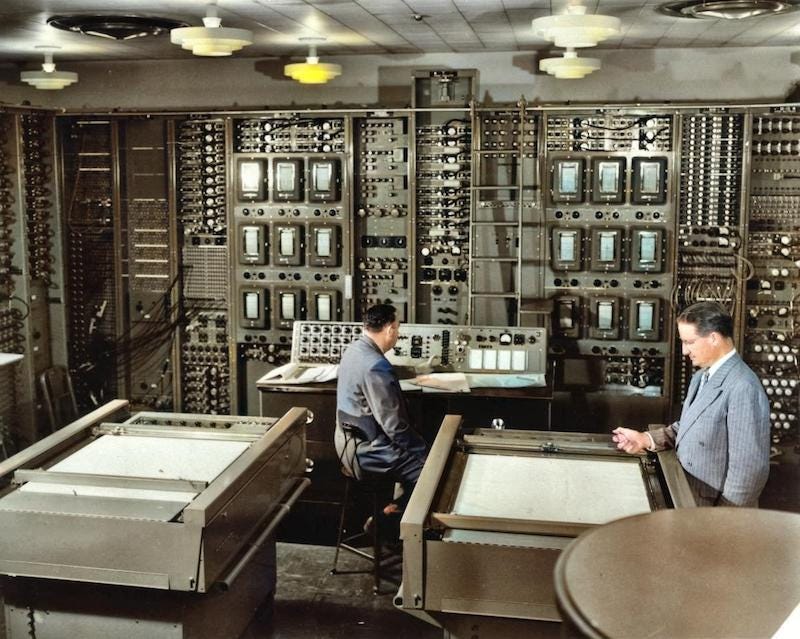Space Time Computer
Prisoners of the present. Victims of the past. Slaves of the future.
Another Monday, Another Naive Weekly - Curated stories on Technology and Internet Culture.

It is Saturday when I am writing this newsletter. Therefore I don’t know what happened Sunday. I don’t know if A$AP Rocky is still in Swedish prison. I don’t know if Julian Alaphilippe managed to protect his yellow jersey in the Tour de France stage to Foix Prat d'Albis.
My excuse for writing the newsletter beforehand is holiday. I am taking a week away from the every day life. Usually I’d be bringing my laptop with me everywhere, also when going on holiday. But this time I have decided to let the computer rest back home.
The early computers were gigantic. Back then no one could possibly bring a computer with them on holiday. The computers would take up entire rooms, so people were walking inside the computers to operate them. Not something you’d easily fit in your airplane hand-luggage.
Recently I read about the early computer history. Where the Internet was developed for a desire to share military information across distances, the early computers were driven by a desire to predict the weather. Understanding the weather was important for military actions and for agriculture, it was quite literally a matter of life and death.
In many ways it seems to have worked. Thanks to the impressive improvement in processing power and the increase in data collecting sources, humans started to be able to predict the weather quite reliable. Weather forecasts provided farmers with the knowledge of when to harvest and military strategists with information of when they should not plan an airborne strike.
In many ways technological progress has become a way for knowing the future. Given enough datasets, a computer should be able to predict what is going to happen next. Provide the computer with all the available data from each of the bike riders in Sunday’s Tour de France stage and it should be able to reliable predict if Alaphilippe is still wearing the yellow jersey when you are reading this.
If a prediction goes wrong, we are not questioning the process of how we came to the forecast in the first place. Instead we work on getting even more and better data. We send satellites to space and put sensors in everything, everywhere.
The early computers were so big that you could step out of them. Today’s computers are so small that we cannot. I might have left my computer behind, but I still have my phone in my backpack and every time my passport is scanned or my credit card is charged, an overwhelming amount of computers are informed.
Today technological development is happening at an incredible pace. Again and again I hear technologists being surprised about how soon new technology is commercially available. We invented the computers to predict the future, but part of me think that when the first human stepped into the computer we lost both the future and the past.
For better and worse, today a late-night tweet from a president can change global politics. For clearly worse, today’s CO2 emissions are changing the global climate, making the weather more extreme and more unpredictable (and large parts of the world unliveable for plants, humans and animals).
Today we might switch on the light and work all night. We might bring our laptops with us and work from anywhere and connect to people everywhere. But where people in the past could confidently predict the professions of their offspring, I highly doubt that many people 10 years ago would have predicted that “YouTuber” would be the dream of the young people across the world in 2019.
The difference between weather and climate is decades. Where the weather is the day-to-day state of the atmosphere, the climate is the weather averaged over periods of up to 30 years. Did we sacrifice predicting the climate in our urge to predict the weather?

The Conference
Earlier this summer Cecilia made my week by asking us to curate a session on the social web for this year’s The Conference. It gave me the opportunity to connect with a few of the people who’s articles I have been sharing in this newsletter and invite them to join us in Sweden.
Last week the last speaker confirmed and I am butterflies all over for having them share different perspectives on the next wave of the social web. We have not announced any of the speakers yet, but if you read these three articles you might be able to guess who’ll be joining us.
Self-discovery Happens Upon Revisiting Things You’ve Accumulated Over Time.
Behind Twitter’s Plan To Get People To Stop Yelling At One Another
It you have nothing else planned for Aug 27-28, please do join us in Malmo.

Naive Weekly
Hi, I’m Kristoffer and I’m one of the founders of co-matter. You just read Naive Weekly - Curated stories on Technology and Internet Culture.
As always a big thanks to the seven Naive Friends who chip in every month or year to support me making time to write this newsletter: Nikolaj, Antal, Søren, Dries, Mikkel, Tina & Angela!
<3
K

